8 Content Marketing Trends You Need to Follow


Everyone talks about keeping content fresh but what actually drives real audience connection in 2024 has changed dramatically. Personalization is no longer just a nice touch and generic messaging now leaves most people cold. Companies that deliver tailored experiences see 40 percent more revenue but the shift goes deeper than just putting a name in an email. The secret is that the best marketers do not focus on content creation alone they focus on creating deeply individual experiences that make customers feel understood in ways mass marketing never could.
Table of Contents
- Personalization In Content Marketing
- Interactive Content For Engagement
- Video Content Dominance
- Voice Search Optimization
- Data-Driven Content Strategies
- User-Generated Content Impact
- Sustainability In Content Marketing
- AI Tools For Content Creation
Quick Summary
| Takeaway | Explanation |
|---|---|
| Personalization is essential for engagement | Tailored content meets unique consumer needs and improves revenue. Understanding audience data is crucial for effective marketing strategies. |
| Interactive content boosts user engagement | Engaging formats like quizzes and games enhance participation and retention, leading to higher conversion rates and valuable user insights. |
| Video marketing offers high ROI | Video content drives engagement and is preferred by consumers, especially younger demographics. Authentic storytelling is key across platforms. |
| Voice search requires strategic keyword optimization | Brands must adapt content for conversational queries to gain visibility in emerging voice search trends, focusing on user intent. |
| Data-driven strategies improve content effectiveness | Utilizing analytics enables marketers to create targeted, responsive content that resonates with audiences and increases consumer engagement. |
1: Personalization in Content Marketing
Personalization has transformed from a marketing luxury to an absolute necessity in content strategy. Modern consumers no longer accept generic messaging but demand tailored experiences that speak directly to their unique needs and preferences.
According to McKinsey & Company, 71% of consumers expect personalized interactions, and companies delivering these experiences generate 40% more revenue.
Effective personalization goes beyond simply inserting a customer's name into an email. It involves creating deeply relevant content that addresses specific pain points, interests, and stages of the customer journey. This requires a sophisticated understanding of audience segmentation and data analytics.
Key strategies for content personalization include:
-
Utilizing advanced audience segmentation techniques
-
Leveraging behavioral data and predictive analytics
-
Creating dynamic content that adapts in real time
Content marketers can achieve personalization through multiple channels: website experiences, email marketing, targeted social media campaigns, and customized content recommendations. The goal is creating a seamless, individualized experience that makes each customer feel uniquely understood.
For more insights, read our guide on creating captivating content that resonates with your specific audience segments.
2: Interactive Content for Engagement
Interactive content represents a powerful evolution in digital marketing, transforming passive consumption into active participation. Audiences no longer want to simply read content they want to engage with it, manipulate it, and derive personalized insights.
According to research in the Journal of Information Science, interactive digital content stimulates deeper cognitive and emotional engagement, increasing information recall and shareability.
Interactive content types that drive significant audience engagement include:
-
Quizzes and assessments that provide personalized results
-
Calculators and tools offering immediate value
-
Interactive infographics with clickable elements
-
Augmented reality experiences
-
Gamified learning modules
The core benefit of interactive content lies in its ability to create two way communication. Instead of broadcasting information, brands can now invite audiences to explore, learn, and discover through dynamic experiences. This approach not only increases time spent with content but also generates valuable data about user preferences and behaviors.
Companies implementing interactive content strategies see substantial improvements in user engagement metrics. Interactive elements can increase conversion rates, build deeper audience connections, and provide rich insights into customer thinking.
Learn more about increasing website engagement through innovative interactive content strategies that transform passive viewers into active participants.3: Video Content Dominance
Video content has emerged as a critical cornerstone of modern digital marketing strategies, dramatically transforming how brands communicate and engage with their audiences. The visual medium offers an unparalleled ability to convey complex messages quickly, emotionally, and memorably.
According to research from the University of New Hampshire, 87% of video marketers report a positive return on investment, with 54% of consumers preferring video content from brands they follow.
Key video content strategies that drive engagement include:
-
Short form vertical videos for mobile platforms
-
Behind the scenes storytelling content
-
Live streaming interactive experiences
-
Educational and tutorial style videos
Modern video content transcends traditional advertising. It's about creating authentic narratives that resonate with specific audience segments. Different platforms demand different approaches brands must craft platform specific video strategies for TikTok, Instagram Reels, YouTube, and emerging social media channels.
Particularly compelling is video's ability to connect with younger demographics. Generation Z demonstrates a strong preference for video based content, making it essential for brands targeting younger markets.
Learn how to optimize your videos for maximum SEO impact and ensure your visual content reaches its full potential in the digital marketplace.4: Voice Search Optimization
Voice search has rapidly transformed digital interactions, pushing content marketers to rethink traditional SEO strategies. With smart speakers and voice assistants becoming ubiquitous, optimizing content for conversational queries is no longer optional but essential.
According to research from the University at Albany, voice based queries are distinctly different from text searches. They tend to be longer, more conversational, and structured like natural language.
Key considerations for voice search optimization include:
-
Using natural language and question based keywords
-
Creating concise, direct answer style content
-
Implementing structured data markup
-
Targeting featured snippet opportunities
Successful voice search optimization requires understanding user intent and creating content that directly answers specific questions. This means developing conversational content that mirrors how people actually speak and ask questions.
Smartphones and smart home devices are driving significant growth in voice search, with users preferring quick, precise answers. Brands that can provide immediate, contextually relevant information will gain a competitive advantage in this emerging digital landscape.
Learn how to leverage SEO strategies for digital growth and stay ahead in the evolving world of voice search and digital content marketing.5: Data-Driven Content Strategies
Data has become the cornerstone of effective content marketing, transforming intuition driven approaches into precise, measurable strategies. Modern marketers now leverage sophisticated analytics to understand audience behavior, predict trends, and create hyper targeted content experiences.
According to research from ResearchGate, data driven strategies dramatically improve consumer engagement and return on investment.
Key elements of successful data driven content strategies include:
-
Implementing advanced audience segmentation techniques
-
Utilizing predictive analytics for content planning
-
Tracking comprehensive performance metrics
-
Conducting continuous A/B testing
Real time data analysis enables marketers to make immediate adjustments, ensuring content remains relevant and compelling. By understanding detailed metrics like engagement rates, time spent on page, and conversion paths, brands can craft more intelligent and responsive content strategies.
The most successful organizations view data not just as numbers, but as a narrative about customer preferences, pain points, and potential future behaviors. Sophisticated data tools now allow unprecedented insights into audience psychology and content consumption patterns.
Learn more about content distribution strategies that can help you maximize the impact of your data driven approach and reach your target audience more effectively.6: User-Generated Content Impact
User-generated content (UGC) has emerged as a powerful force in modern content marketing, transforming how brands interact with their audiences. This authentic, consumer-created material provides unprecedented social proof and builds genuine connections that traditional marketing strategies cannot replicate.
According to research published in the International Journal of Business Management, there is a statistically significant relationship between positive user generated content and brand advocacy.
Key aspects of effective user-generated content strategies include:
-
Encouraging customer reviews and testimonials
-
Creating brand specific hashtag campaigns
-
Developing community driven content platforms
-
Incentivizing authentic customer storytelling
Consumers inherently trust peer recommendations more than branded messaging. When customers create content about a product or service, they provide social validation that traditional advertising cannot match. This organic approach not only increases credibility but also generates higher engagement rates across digital platforms.
Successful brands are now treating their customers as collaborative content creators, transforming passive consumers into active brand ambassadors. By providing platforms and incentives for customers to share their experiences, companies can generate a continuous stream of authentic, compelling content.
Learn how to boost brand trust through user-generated content and create more meaningful connections with your audience.7: Sustainability in Content Marketing
Sustainability has transitioned from a peripheral corporate concern to a central narrative in content marketing. Modern consumers demand transparency, ethical practices, and genuine commitment to environmental and social responsibility from the brands they support.
According to research in ECS Transactions, content marketing strategies that emphasize sustainability can generate significant business advantages, including cost reduction, resource efficiency, and competitive positioning.
Essential strategies for integrating sustainability into content marketing include:
-
Highlighting authentic environmental initiatives
-
Showcasing transparent supply chain practices
-
Demonstrating measurable social impact
-
Creating educational content about sustainability
Storytelling becomes a powerful tool when brands communicate their sustainability journey. This approach goes beyond traditional corporate messaging, inviting audiences to become active participants in meaningful change. Consumers are increasingly making purchasing decisions based on a company's demonstrated commitment to sustainable practices.
The most effective sustainability content combines emotional storytelling with concrete data. Brands that can articulate their environmental and social commitments through compelling narratives will differentiate themselves in an increasingly conscious marketplace.
Learn about top content engagement strategies that can help you communicate your sustainability mission effectively and authentically.8: AI Tools for Content Creation
Artificial intelligence has revolutionized content creation, offering unprecedented capabilities for generating, optimizing, and personalizing digital content at scale. What was once a complex, time consuming process is now streamlined through intelligent automation.
According to research from the AI Academic Framework, generative AI provides powerful tools for producing diverse and engaging content across multiple platforms and formats.
Key considerations for implementing AI content tools include:
-
Maintaining authentic brand voice
-
Ensuring ethical and original content generation
-
Balancing AI assistance with human creativity
-
Implementing robust fact checking processes
AI content creation tools are not replacement technologies, but collaborative platforms that augment human creativity. They excel at tasks like generating initial drafts, suggesting content improvements, conducting research, and identifying potential topic angles that writers might overlook.
The most advanced AI tools now offer nuanced capabilities beyond simple text generation.
The table below provides a comprehensive summary of the key content marketing trends, strategies, benefits, and actionable insights discussed in the article.
| Trend/Strategy | Description | Key Benefits/Outcomes |
|---|---|---|
| Personalization in Content | Creating tailored experiences based on consumer data and preferences using segmentation and analytics | Boosts engagement and revenue (+40%), makes customers feel valued |
| Interactive Content | Integrating quizzes, calculators, infographics, and gamification to drive active participation | Higher user engagement, deeper insights, increased conversions |
| Video Content Dominance | Utilizing short-form, storytelling, and educational videos across platforms to engage audiences | Strong ROI, preferred by Gen Z, enhances emotional connection |
| Voice Search Optimization | Adapting content for natural, conversational queries for smart assistants and voice-enabled devices | Increases visibility, meets user intent, captures new search trends |
| Data-Driven Content Strategies | Leveraging analytics and segmentation to guide content planning and execution | More relevant content, real-time optimization, higher engagement |
| User-Generated Content (UGC) | Encouraging reviews, testimonials, and community content to foster authenticity | Builds social proof, trust, and brand advocacy |
| Sustainability in Content | Showcasing authentic environmental, social, and ethical practices through storytelling | Appeals to conscious consumers, differentiates brand, reduces costs |
| AI Tools for Content Creation | Using AI for content generation, optimization, and personalization while ensuring originality | Scalable content output, efficiency, enhanced creativity |
| They can analyze audience engagement patterns, suggest SEO optimizations, predict content performance, and even help craft more compelling narratives by understanding subtle contextual nuances. |
Ready to Take the Lead With AI-Driven Content Marketing?
If you are overwhelmed by the need to personalize, engage, and scale your content in a rapidly changing digital landscape, you are not alone. Business owners and marketers today face challenges like maintaining relevance, boosting engagement, and keeping up with SEO best practices. The trends highlighted in this article, such as video content, personalization, voice search, and AI tools, are exciting—but they can also feel impossible to manage manually. Is your team struggling to balance creative ideas with the technology needed to compete?
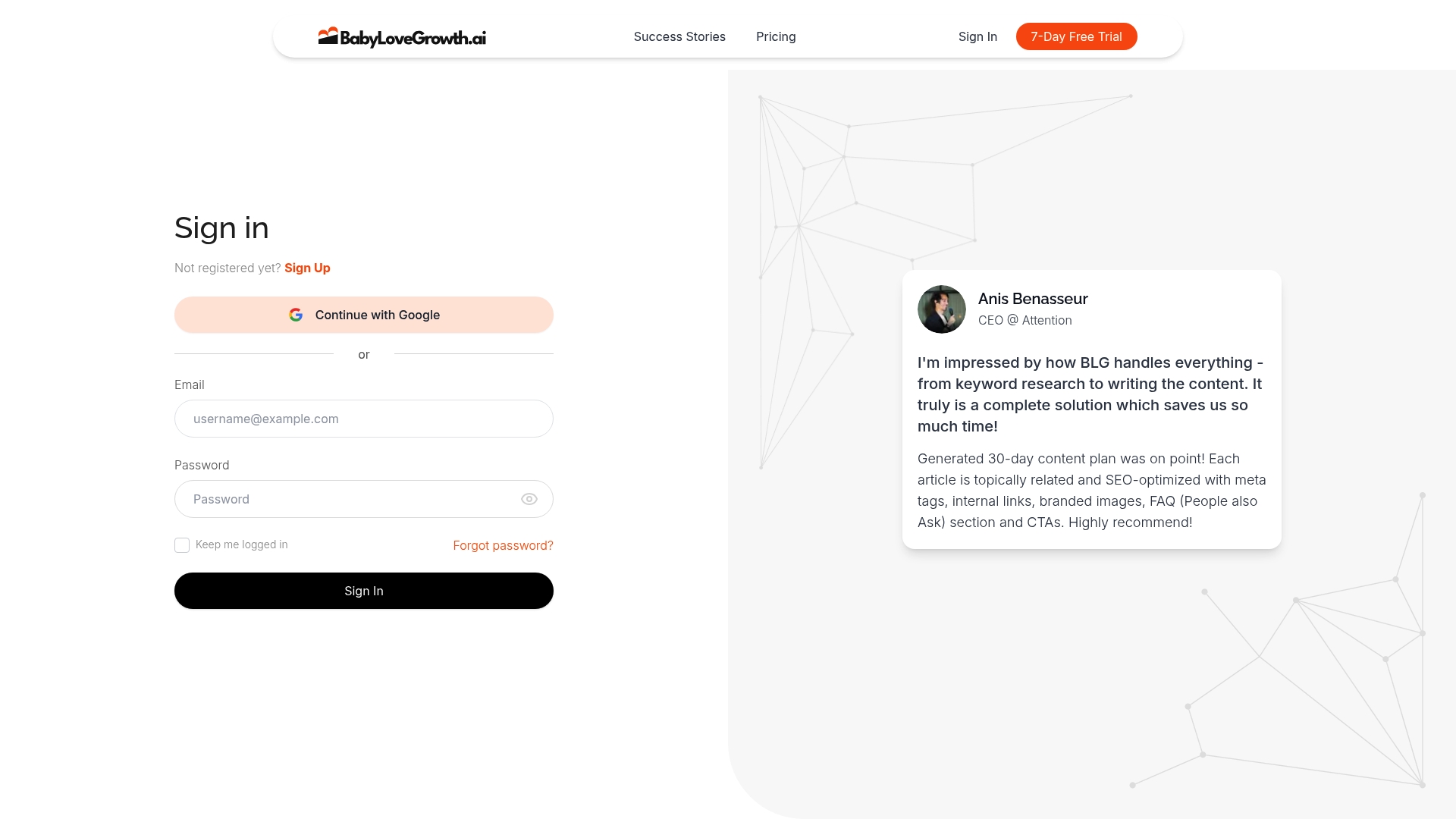
Stop losing ground to competitors who are already automating their growth. Switch to Babylovegrowth.ai and simplify your content process from day one. Our AI-powered platform delivers high-quality, SEO-optimized articles, a personalized 30-day content calendar, and backlinks exchange—all designed to help you rank higher on Google and ChatGPT. Experience the future of effortless marketing now by trying our free trial, or learn how to master your content calendar to align your strategy with the latest trends. Your next era of organic growth starts here.
Frequently Asked Questions
What is personalization in content marketing?
Personalization in content marketing refers to tailoring content to meet the specific needs, preferences, and behaviors of individual users, creating deeper engagement and improved marketing results.
How does interactive content enhance audience engagement?
Interactive content enhances engagement by turning passive viewers into active participants, encouraging them to interact with the content and share their insights, leading to higher information retention and brand loyalty.
Why is video content important for marketing strategies?
Video content is crucial because it effectively communicates complex messages quickly and memorably, significantly boosting engagement and improving return on investment for brands.
What role does user-generated content play in marketing?
User-generated content builds authentic connections and trust between brands and consumers, as potential customers often trust peer recommendations over traditional advertising.
Recommended
Smart SEO,
Faster Growth!
Most Read Articles
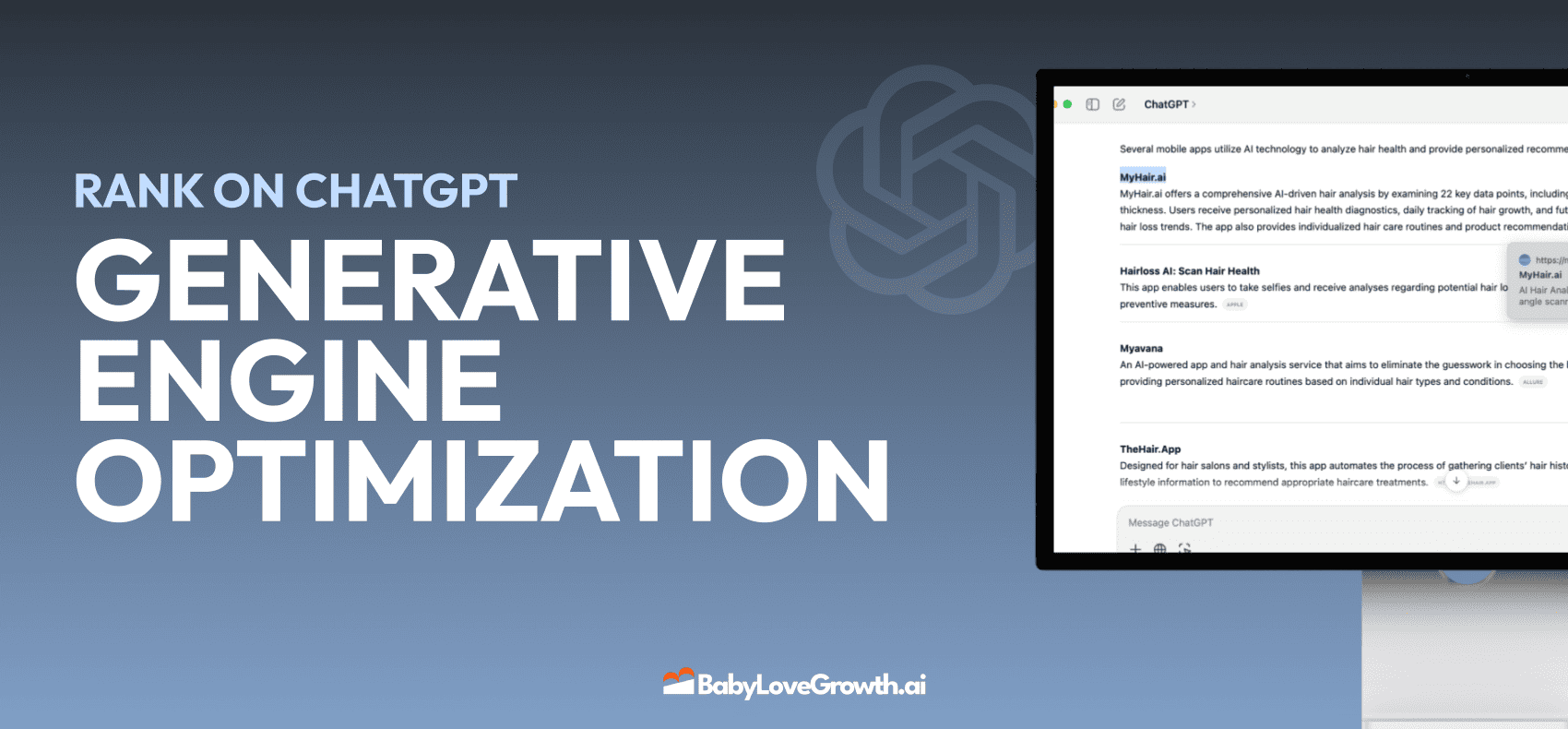
Generative Engine Optimization (GEO)
Learn how Generative Engine Optimization (GEO) helps your content rank in AI search engines like ChatGPT and Google AI. This comprehensive guide explains the differences between SEO and GEO, why it matters for your business, and practical steps to implement GEO strategies for better visibility in AI-generated responses.
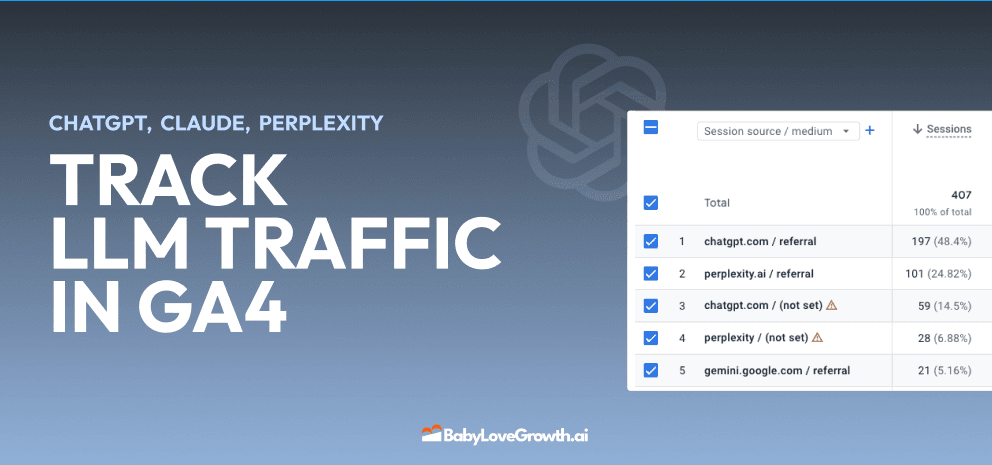
Track LLM Traffic in Google Analytics 4 (GA4)
Learn how to track and analyze traffic from AI sources like ChatGPT, Claude, Perplexity, and Google Gemini in Google Analytics 4. This step-by-step guide shows you how to set up custom filters to monitor AI-driven traffic and make data-driven decisions for your content strategy.
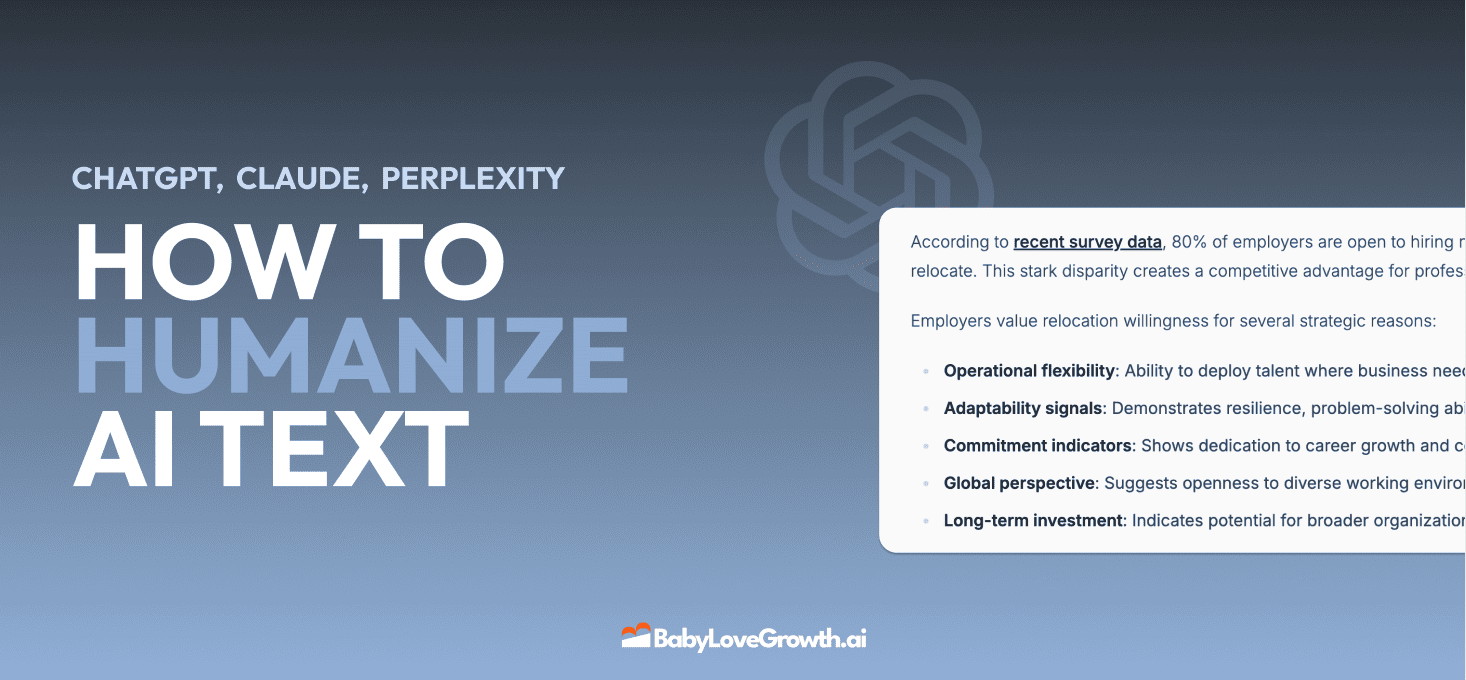
How to Humanize AI Text with Instructions
Learn practical techniques to make AI-generated content sound more natural and human. This guide covers active voice, direct addressing, concise writing, and other proven strategies to transform robotic text into engaging content.
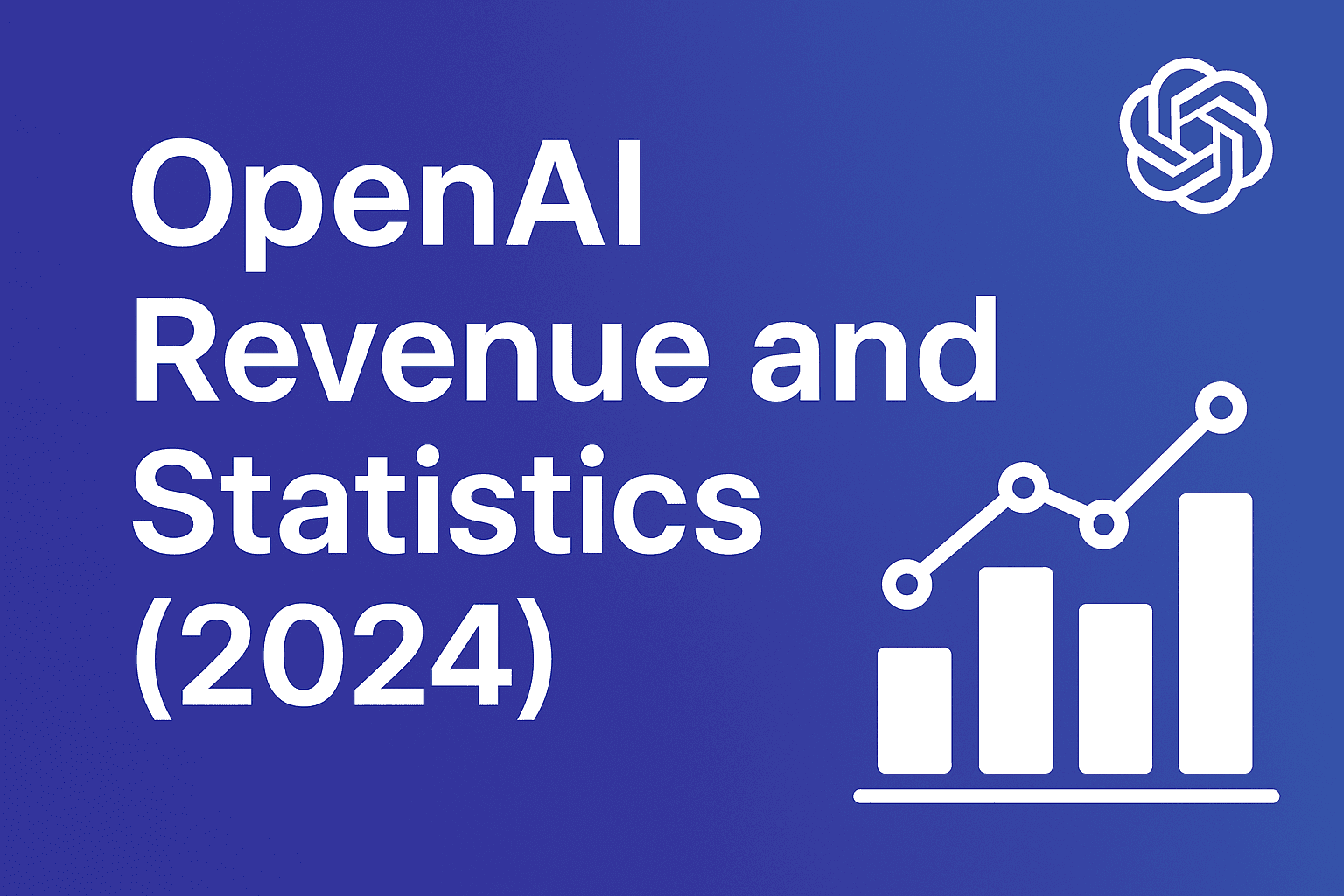
Open AI Revenue and Statistics (2024)
Comprehensive analysis of OpenAI financial performance, user engagement, and market position in 2023. Discover key statistics including $20B valuation, $1B projected revenue, and 100M+ monthly active users.